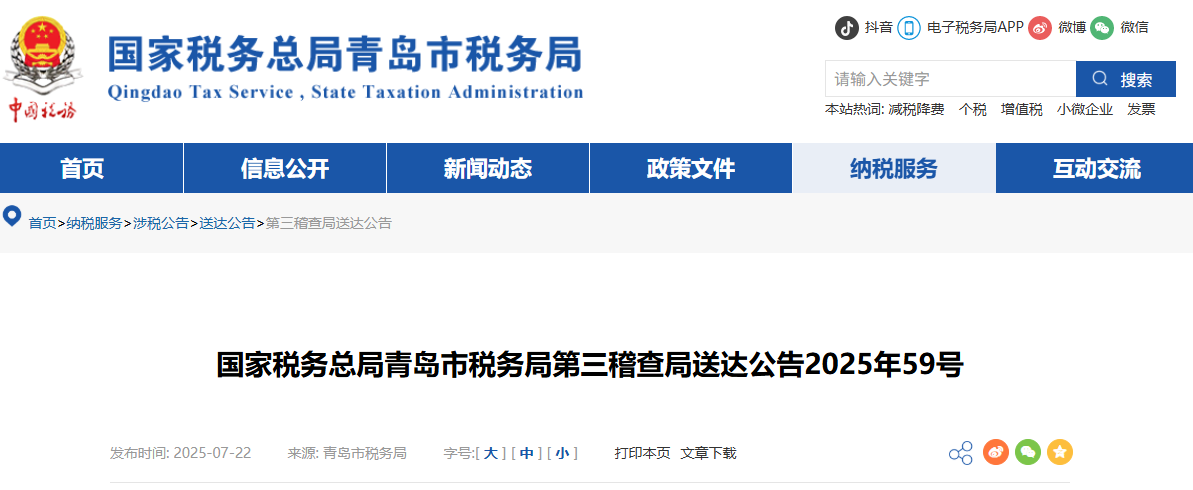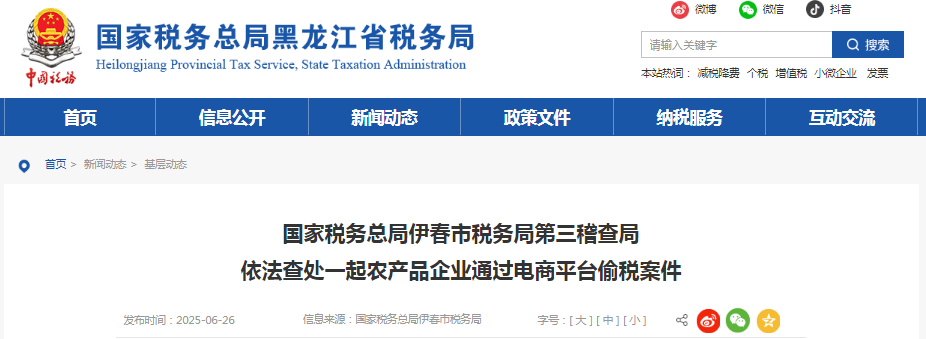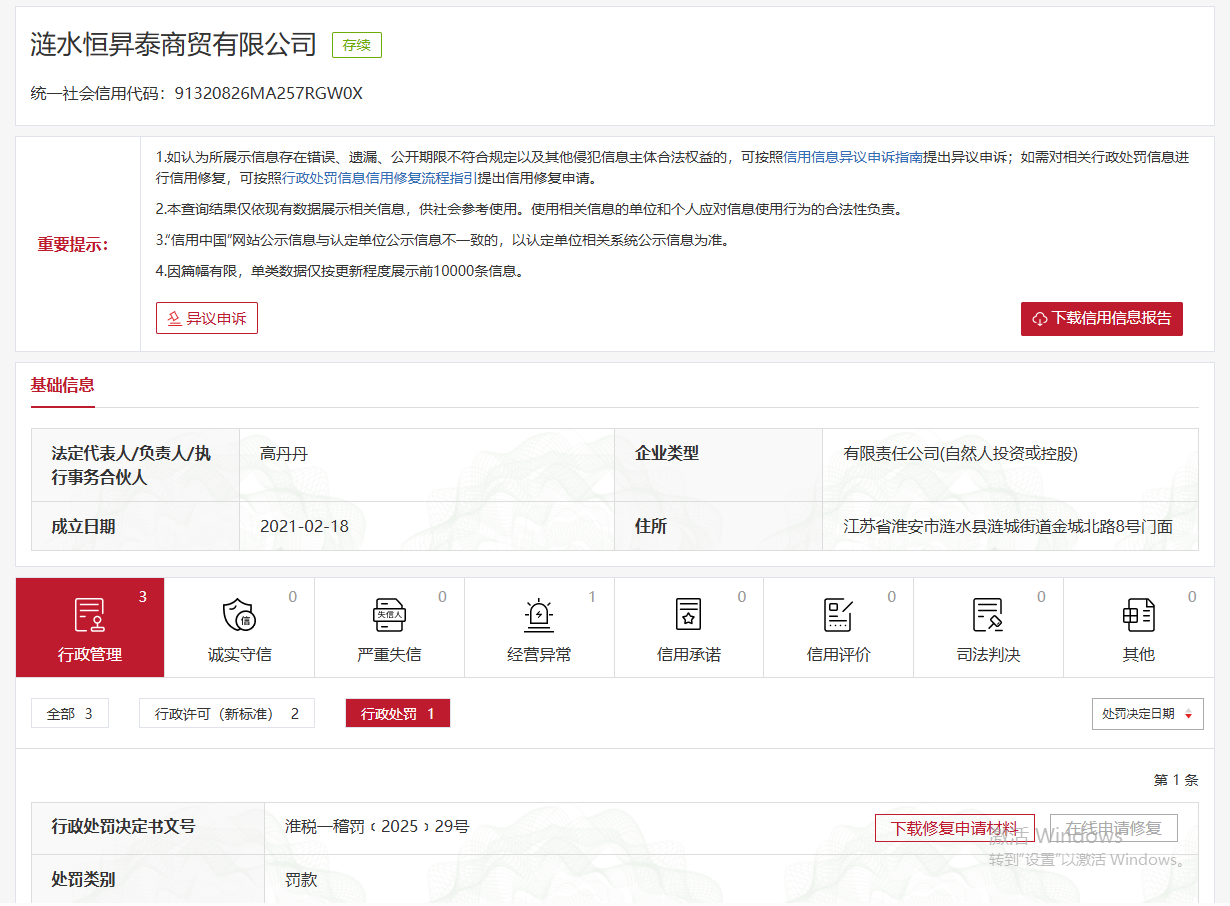New regulations are in effect! Tax authorities strengthen their supervision capabilities, and what tax impacts do e-commerce companies face
Editor's note: Recently, the State Council issued and implemented the "Regulations on the Submission of Tax-related Information by Internet Platform Enterprises" (hereinafter referred to as the "Regulations"), and the State Administration of Taxation also issued corresponding supporting announcements. The new regulations require internet platform companies to submit tax-related information of platform operators to the tax authorities within the prescribed time limit and content. On the one hand, the implementation of the new regulations enhances the ability of tax authorities to investigate and deal with tax evasion by e-commerce companies. On the other hand, against the backdrop of "tax governance with data" becoming the core trend of tax governance, the implementation of the new regulations also means that e-commerce companies are facing new tax compliance challenges. Based on this, this article will discuss the impact of the new regulations on tax authorities and e-commerce enterprises in conjunction with the "Regulations on the Submission of Tax-related Information by Internet Platform Enterprises" and its supporting announcements.
Ⅰ、The Case observation: How tax authorities investigate and deal with tax evasion by e-commerce enterprises from the case of tax evasion by e-commerce enterprises
Before the introduction of the "Regulations" and their supporting announcements, the tax authorities mainly handled cases of tax evasion by e-commerce companies through the use of big data and tracking of fund flows. For details, see the case.
Case 1: The tax bureau's big data comparison found that the total transaction volume of e-commerce enterprises does not match the declared income data

The Qingdao Taxation Bureau investigated and dealt with the case of hidden income and tax evasion at a Xiaoqi clothing store in Jimo District. The tax bureau found that the company's declared income was 328,539.67 yuan through the third phase of the Golden Tax declaration data, but the company obtained income of 56,793,143.83 yuan through the Douyin platform and withdrew 53,207,773 yuan. By comparing the sales revenue obtained by the involved companies through the Douyin platform with the third phase of the Golden Tax, the tax bureau found that the involved companies did not fully declare their income and engaged in illegal activities of concealing income. The tax bureau classified the behavior of concealing income by the involved companies as tax evasion and imposed a fine of 1,013,429.15 yuan for underpaid taxes.
Case 2: The tax bureau found out that e-commerce companies evaded taxes through industry characteristics comparison

The tax bureau of Yichun City received reports from the public that Heyuan The Forest Food Co., Ltd. was hiding sales revenue from e-commerce platforms. The tax bureau comprehensively reviewed the tax-related materials such as invoice issuance and tax declaration of the involved company, and compared the operating data of the same region, scale, and industry horizontally. It was found that the company's declared sales revenue significantly deviated from the industry average, and the abnormal characteristics of operating data gradually emerged. Tax bureau inspectors, based on industry characteristics, gradually restored the overall picture of online sales by sorting out the transaction records of enterprise-related accounts. The company involved sold local specialty agricultural products such as black fungus on multiple e-commerce platforms, with e-commerce sales revenue exceeding 2 million yuan. The tax bureau confirms that there is a significant difference between the e-commerce sales scale and the declared information based on the cross-validation enterprise declaration data and offline business records. Finally, the tax bureau determined that the company involved in the case had concealed income to evade taxes and made a decision to recover taxes, late fees, and impose fines.
Case 3: The tax bureau confirms the tax evasion of e-commerce enterprises through the platform's handling fee and reverses the sales amount

Based on the reported clues, the Jilin Municipal Taxation Bureau has investigated and dealt with a case of a company concealing sales revenue from online stores to evade taxes. The tax bureau's inspection personnel conducted a comprehensive analysis of the tax-related data of the enterprises involved in the case, and preliminarily determined that the enterprises involved in the case had tax issues through product packaging fees, express delivery fees, etc. The tax bureau's inspectors conducted on-site investigations and found no valuable clues through the retrieval of the company's account book data. The inspectors were unable to determine whether the company involved in tax evasion through on-site investigations. Therefore, the tax bureau's inspectors changed their investigation direction and found a breakthrough by analyzing the transaction data of the online stores of the companies involved. They found that the companies involved settled more than 89 million yuan from e-commerce platforms. The company involved in the case had a total income of more than 35 million yuan that was not declared in accordance with the law. Finally, the tax bureau confirmed the fact that the company involved concealed income and evaded taxes.
Case 4: The tax bureau found out that e-commerce companies evaded taxes by accessing data from e-commerce platforms

The tax bureau inspection personnel obtained sales data from third-party platforms such as Douyin and Youzan of the involved trading companies, and integrated the offline wholesale sales of the trading companies. After comparing the declared data with the trading company, it was found that the trading company in question concealed some income from the sale of goods from March 2021 to September 2024 without declaring and paying taxes, resulting in a total underreported sales amount of 156,104,19.97 yuan (excluding tax). Among them, the yuan in 2021 is 13,268.66 yuan, the yuan in 2022 is 2,983,979.57 yuan, the yuan in 2023 is 10,033,322.17 yuan, and the yuan in 2024 is 2,574,849.57 yuan. The tax bureau believes that the company involved in the case constitutes tax evasion and imposes an administrative penalty of 1,082,267.87 yuan on the company involved.
Summary: Through the above cases, it can be found that before the implementation of the "Regulations" and supporting announcements, tax authorities mostly used various means such as big data comparison and "platform deduction fees" to calculate the operating data of e-commerce enterprises, etc., to investigate and deal with illegal acts of tax evasion by e-commerce enterprises. Before the implementation of the "Regulations" and supporting announcements, when tax authorities used these means to investigate and deal with tax violations by e-commerce companies, due to the fact that the e-commerce platform belongs to enterprises outside the jurisdiction of a certain local tax authority, the tax authorities often faced problems such as a long period of time and difficulty in obtaining complete evidence. After the implementation of the "Regulations" and supporting announcements, internet platform enterprises have various obligations such as submitting tax-related information to the tax authorities, and the tax authorities' regulatory capabilities for e-commerce enterprises will be further enhanced.
Ⅱ、After the implementation of the "Regulations" and supporting announcements, how the tax authorities will investigate and deal with illegal acts such as tax evasion by e-commerce enterprises
After the implementation of the "Regulations" and their supporting announcements, the tax authorities' tax supervision capabilities for the e-commerce industry have been further strengthened under the requirements of the "Regulations". Tax authorities can learn whether e-commerce companies have evaded taxes from various aspects such as government information sharing and tax-related data submitted by platform companies, thereby strengthening tax governance for e-commerce companies. The details are as follows.
Firstly, according to Article 2, Article 3, and Article 4 of the "Regulations", internet platform enterprises should submit various information such as the identity information and income information of platform operators and practitioners to the state organs within the specified dates. Specifically, the tax-related information submitted by internet platform companies includes the identity information of operators and practitioners within the platform, income information, such as income obtained from the sale of goods, services, intangible assets, including total income, refund amount, net income, etc. Various tax-related information such as transaction (order) quantity. Internet platform companies are responsible for the authenticity, accuracy, and completeness of this information. This regulation breaks the difficulties and long evidence collection cycles faced by tax authorities in investigating illegal activities such as tax evasion by e-commerce companies in the past. Tax authorities compare tax-related information submitted by internet platform companies through big data comparisons. It is easier to find e-commerce companies that evade taxes. The difficulty of obtaining evidence for tax authorities has been greatly reduced, which is conducive to tax authorities' supervision of the e-commerce industry.
Secondly, according to Article 7 of the "Regulations," "When tax authorities conduct tax inspections in accordance with the law or discover tax-related risks, they may require internet platform companies and relevant parties to provide tax-related information such as contract orders, transaction details, fund accounts, and logistics of operators and practitioners suspected of illegal activities within the platform." Internet platform enterprises and relevant parties should provide truthful information in accordance with the deadline, method, and content required by the tax authorities. According to the content of the "Regulations", internet platform companies have the obligation to submit tax-related information to the tax authorities. This legal provision provides a legal basis for tax authorities to require internet platform companies to cooperate with tax investigations, facilitating tax authorities to strengthen tax supervision of e-commerce companies. In the past, when tax authorities investigated and dealt with e-commerce companies for tax evasion, there was no clear legal basis that internet platform companies must cooperate with tax authorities in tax investigations, making it difficult for tax authorities to obtain information on tax evasion from internet platform companies. After the implementation of the "Regulations", internet platform enterprises have the obligation to cooperate with tax authorities in conducting tax investigations. Internet platform enterprises need to provide tax-related information such as contract orders of the enterprises involved to the tax authorities according to the requirements of the tax authorities.
Finally, according to Article 8 of the "Regulations", "the departments of industry and information technology, human resources and social security, transportation, market supervision, and internet information should strengthen the sharing of tax-related information with the tax authorities." Tax authorities shall not require Internet platform enterprises to submit tax-related information that can be obtained through information sharing. According to the law, different government departments should strengthen the sharing of tax-related information. Through information sharing among multiple departments, tax authorities can discover whether e-commerce companies have engaged in illegal activities such as tax evasion through information sharing in a certain link. With the help of information sharing among multiple departments, tax supervision of e-commerce companies can be better strengthened, forming a dynamic supervision system among multiple departments.
Ⅲ、The Tax risks faced by e-commerce enterprises after the implementation of the "Regulations" and supporting announcements
After the implementation of the "Regulations" and their supporting announcements, if e-commerce companies do not adjust their tax compliance strategies in a timely manner, they may face many tax risks. The details are as follows.
First, e-commerce companies face tax risks in terms of income declaration. According to the "Regulations" and the "Announcement of the State Administration of Taxation on Matters Related to the Submission of Tax-related Information by Internet Platform Enterprises" (Announcement No. 15 of the State Administration of Taxation in 2025) (hereinafter referred to as "Announcement No. 15"), Internet platform companies need to report the income information of operators and practitioners on the platform to the tax authorities, such as total income, refund amount, net income, and transaction (order) quantity. Under these regulations, the previous behavior of e-commerce companies concealing income through e-commerce platforms or other means will be exposed. Tax authorities can clearly understand the income and other information of a certain e-commerce company through the submitted tax-related data, and then determine whether it has evaded taxes. In addition, through case studies, it was found that some e-commerce companies evade taxes through off-book operations and private income sharing. After the implementation of the "Regulations" and supporting announcements, tax-related information such as contract orders, transaction details, fund accounts, and logistics of e-commerce enterprises will be submitted to the tax authorities. In other words, tax authorities will clearly understand the real income of e-commerce companies through tax-related data such as contract orders. If e-commerce companies evade taxes through off-the-book operations and other means, they will face administrative and even criminal responsibilities.
Secondly, e-commerce companies face the tax risks of false transactions such as fraudulent transactions. In the process of the development of the e-commerce industry, some e-commerce companies will increase store sales through false transaction methods such as brushing orders in order to increase exposure and attractiveness. After the implementation of the "Regulations" and supporting announcements, internet platform enterprises shall submit tax-related information such as income of e-commerce enterprises to the tax authorities. If e-commerce companies increase sales through methods such as brushing orders, although the brushing process is false, if the transaction records, fund flow, and logistics information are complete, it is easy to be recognized by the tax authorities as genuine sales revenue, and they need to pay value-added tax, corporate income tax, and may be charged late fees. It may also lead to the risk of criminal responsibility such as tax evasion.
Ⅳ、How to deal with tax risks after the implementation of the "Regulations" and supporting announcements
After the implementation of the "Regulations" and supporting announcements, e-commerce enterprises should strengthen the construction of tax compliance systems from various aspects such as financial system construction and invoice management to avoid tax risks.
First, in terms of the financial system. In the aforementioned cases, it was found that some e-commerce companies have incomplete financial systems, which can easily lead to tax risks. After the implementation of the "Regulations" and the drug distribution announcement, e-commerce enterprises should strengthen the construction of financial systems in accordance with the requirements of the "Regulations" and supporting announcements, and enhance tax compliance from multiple aspects. Financial system construction requires e-commerce companies to accurately record economic business data such as income and costs, ensuring that online transaction data is consistent with financial records, and achieving the integration of "goods flow, fund flow, and invoice flow". Ensure that each income or expenditure is traceable, and avoid tax risks caused by financial system issues. In addition, strengthening the construction of financial systems also requires e-commerce companies to establish standardized accounting processes for third-party payment platform payments, etc., to avoid tax risks such as off-book operations caused by non-standard payments through third-party platforms.
Secondly, in the aspect of invoice management. Require e-commerce companies to ensure the authenticity and legality of invoices, actively request compliant invoices, and eliminate behaviors such as purchasing without invoices. Various invoices of e-commerce enterprises should be issued truthfully to ensure that the invoice content matches the actual transaction, avoid false transactions such as slipping, and prevent tax risks such as false invoices caused by slipping. In other words, e-commerce companies need to strengthen the review and storage of invoices to prevent risks such as false invoicing. Standardize the invoice process, establish a full-process review mechanism for invoice issuance, acquisition, and certification, and ensure the authenticity and reliability of each invoice.
Ⅴ、Concluding
The implementation of the "Regulations on the Submission of Tax-related Information by Internet Platform Enterprises" and its supporting announcements not only strengthens the tax supervision capabilities of tax authorities but also puts forward new requirements for the tax compliance of e-commerce enterprises. In the new regulatory environment, e-commerce enterprises should strengthen the compliance construction of various tax-related systems such as financial systems in accordance with the requirements of the "Regulations" and supporting announcements. When facing tax issues that cannot be dealt with, you can seek professional help to avoid tax risks.





